Is it unhealthy to sleep with the windows closed in your bedroom? co2?
Barret Smith
5 years ago
Featured Answer
Sort by:Oldest
Comments (27)
Molly
5 years agosktn77a
5 years agoRelated Discussions
Bedroom Door: Open or Closed?
Comments (50)Mine is usually open. One cat is usually hiding in my closet, which is off my bathroom. I keep the closet door open and the bathroom door closed. Bathroom is off my bedroom, and I leave the bedroom door open. So she has lots of room, and access to water if her bowl gets empty. Buddy, my new 'shadow', is always behind me, or almost glued to my let. He would sleep on my head if I'd let him. But, I usually can push/move him over enough so I can turn over. Leslie...See MoreWindow treatments for a box bay window in master bedroom?
Comments (5)I used a board-mounted box pleated valance on the box bay in my dining room. I screwed the board right into the soffit above the window. The way mine was framed, there wasn't enough room to hang a rod high enough to cover the top of the window trim. I made long panels of the same fabric for my living room windows. I used honeycomb shades on all the windows (not room darkening, but I did consider them). Most of the time I leave them up, but we don't have a guest room and the sleep sofa is in the living room, so privacy is an issue when we have overnight guests. Totally Confused...See MoreClose off doorway to convert dining room to bedroom
Comments (10)Lilac, welcome to the group. If that doorway is 70 inches WIDE, that will be too wide for a tension rod to span. However, you might think about getting a SHOWER ROD, WHICH IS ABOUT 6 FEET LONG, and a diameter of more than one inch. You could even put a sexy shower curtain on that rod and also hang the canvas drop cloths on the same rod. Shower hooks are great, or even the set of shower rings. I have used the 9 strand 100 pound stainless steel picture hanging wire to hang curtains. In my case, I bought a 100 foot roll of it, but you can get it in lengths. OR, you might go to a place like RESTORE which is a Habitat for Humanity resale place. They have many many doors that came off closets, like the bifold shutter doors. I've found many nice doors that way. If you cannot screw them to the woodwork, and you want to take any purchased items with you when you go, think about attaching the doors to a bookcase or entertainment center at the side so you can open/close the bifolds. It is possible, depending on the size of the room and the location of that wide doorway in it, that you could position an entertainment center in front of the opening, and leave only enough space to have a 28 inch entry to your bedroom. I'm assuming that closing the passage to the kitchen from the dining room will still give you another entry to your kitchen? Quite an interesting question, and you can definitely make your choice attractive. Also note, I use the regular canvas painter drop cloths, available in all sizes, very washable and quite durable, as slip cover for my furniture, bird cages, curtains, pillow covers, bed throws, and I can paint on them and make them tough and hard for small rugs at the doors. Very washable, very durable, and the cheapest thing you can buy. Sort of the color of oatmeal denim, and as durable as a canvas bag....See MoreDo you have a phone in your bedroom
Comments (64)"Have you known anyone whose house was broken into during the night?" YES! My SIL was burglarized twice, while she was in bed. Once shortly after she retired for the night, the other time in the wee hours of the morning. And she lives in a residential section that is considered very 'safe'. She says she did the only thing she knew to do, and just stayed very very still, pretending to be soundly asleep. And the police told her that was a wise decision on her part. Don't think I could have done that! Yes I have a phone with me at all times. My smart phone is clipped to my jeans' pocket or belt at all times during the day, and on my night stand at night. Before I had a cell phone, the land line was on my night stand. Back then it was because my husband was a trucker so I kept the phone close in case he needed to contact me about anything. Also in case one of the kids or grandkids needed me. Husband is deceased and kids and grandkids are grown, but I still keep it close for the same reasons. Also because my kids (and Grands) want me to for their peace of mind. They know my balance is very bad, along with other health issues. I really do feel much safer with a phone within arms reach. Rusty...See MoreElmer J Fudd
5 years agomike_home
5 years agoklem1
5 years agoElmer J Fudd
5 years agoopaone
5 years agoopaone
5 years agolast modified: 5 years agoAustin Air Companie
5 years agomike_home
5 years agolast modified: 5 years agoopaone
5 years agoopaone
5 years agoElmer J Fudd
5 years agoopaone
5 years agolast modified: 5 years agoopaone
5 years agolast modified: 5 years agoOliviag
5 years agoElmer J Fudd
5 years agolast modified: 5 years agoopaone
5 years agolast modified: 5 years agoElmer J Fudd
5 years agoopaone
5 years agolast modified: 5 years agoopaone
5 years agoElmer J Fudd
5 years agolast modified: 5 years agoJenn TheCaLLisComingFromInsideTheHouse
5 years agoAustin Air Companie
5 years agoopaone
5 years agolast modified: 5 years agoElmer J Fudd
5 years agolast modified: 5 years ago
Related Stories

WINDOW TREATMENTSBedroom Window Treatments to Block the Light
Sleep tight with curtains, shades and more designed to keep out bright rays while letting stylishness in
Full Story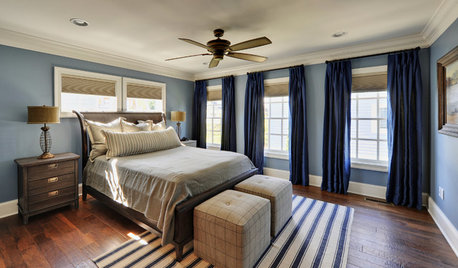
COLORBedroom Color: The Secret to More Sex and More Sleep
Look to surprising revelations about bedroom wall colors to get more of what you want
Full Story
HOMES AROUND THE WORLDHouzz Tour: 2-Bedroom Apartment Gets a Clever Open-Plan Layout
Lighting, cabinetry and finishes help make this London home look roomier while adding function
Full Story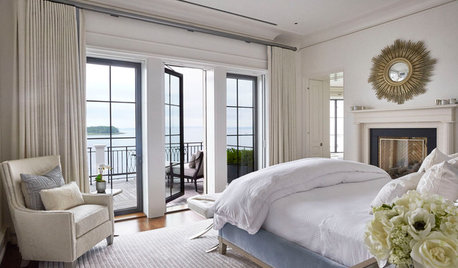
FEEL-GOOD HOMEIs Your Bedroom Designed for a Good Night’s Sleep?
Find out how the right nightstands, bedding, rugs, TV and storage can help you get more restful slumber
Full Story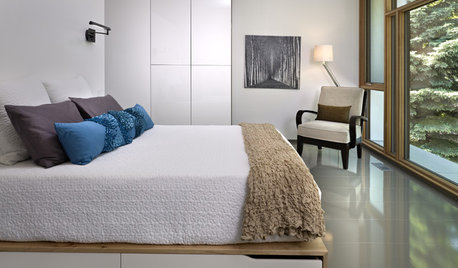
HEALTHY HOMESleep Happier and Healthier in a Toxin-Free Bedroom
Light pollution, toxic bedding, wallpaper that off-gases ... if you're not getting good sleep, these bedroom blights might be to blame
Full Story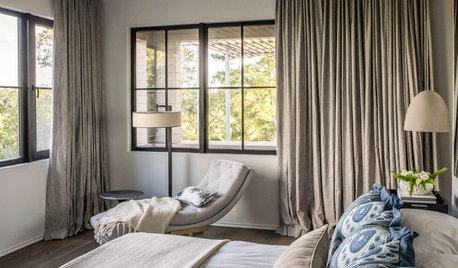
BEDROOMSHow to Set Up Your Bedroom Lighting for a Perfect Night’s Sleep
World Sleep Day is March 15. Here are 5 bright ideas for lighting your bedroom for optimal shut-eye
Full Story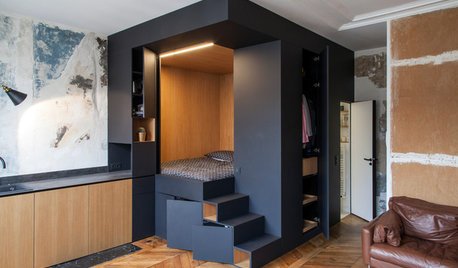
WORLD OF DESIGNTrends: Create a Cozy Bedroom With a ‘Sleeping Box’
Designers share why the unconventional sleep spaces are the perfect solution for these 4 homes
Full Story
HOUZZ TOURSMy Houzz: Creative DIY Personalizes a 2-Bedroom Bungalow
Stenciling, custom finishes and furniture, and Scottish-inspired style give a 1920s home personality and warmth
Full Story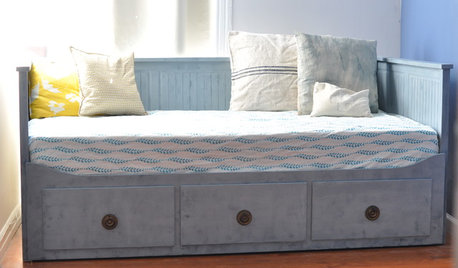
BEDROOMSGreat Space Saver: Bedroom Storage You Can Sleep On
Get a bed with easy built-in storage and eliminate some of those plastic bins and dust bunnies
Full Story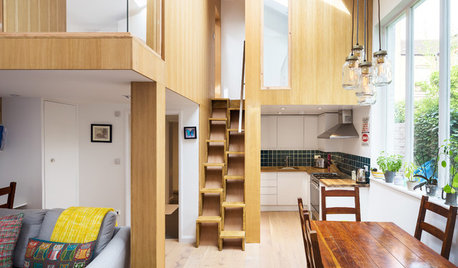
HOMES AROUND THE WORLDMy Houzz: Sleeping Pods Give a Tiny London Home New Life
A smart redesign and closed loft bedrooms carve out more living space in this former artist’s studio
Full Story


opaone